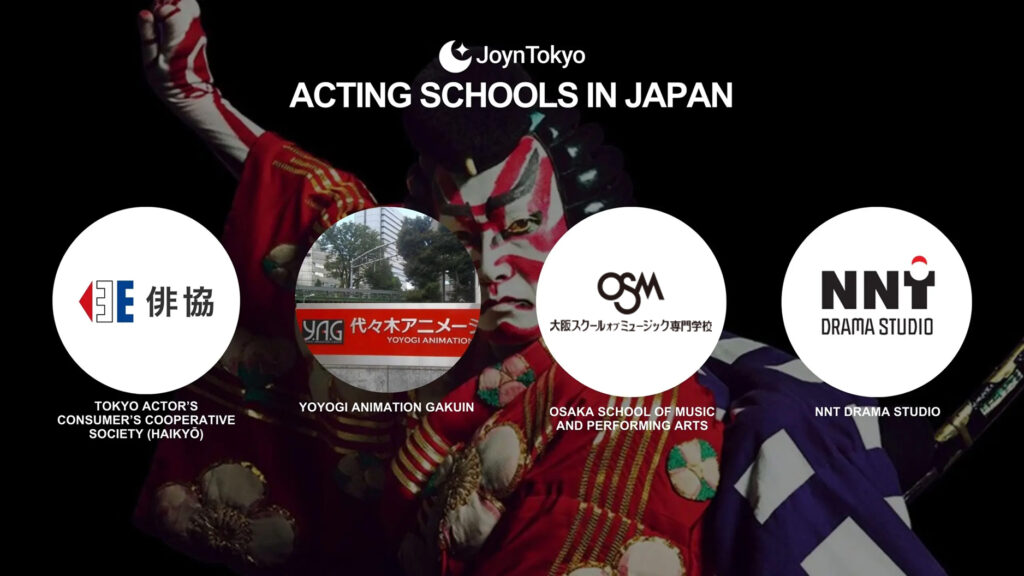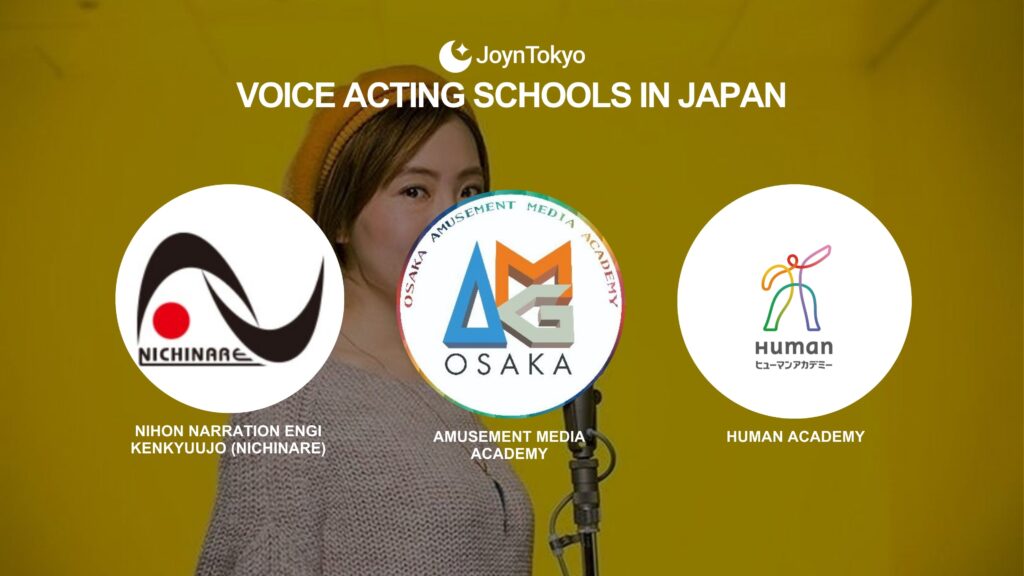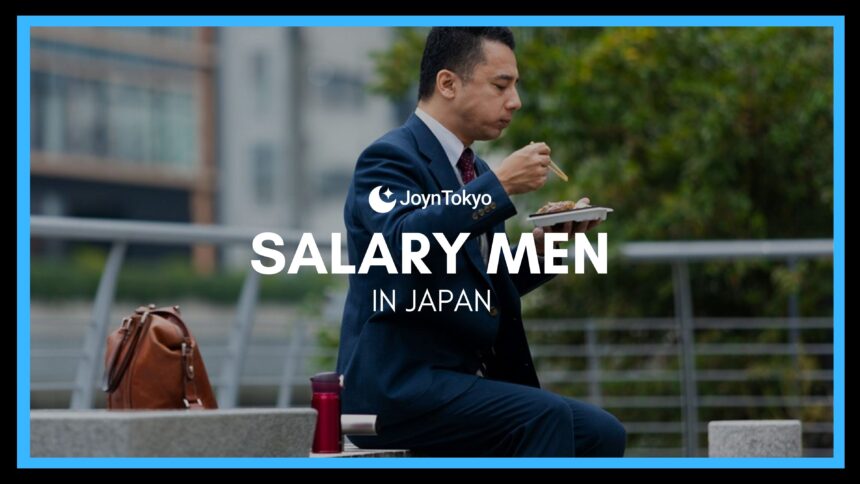Pursuing an acting career in Japan is both exciting and challenging. The country has a thriving entertainment industry spanning film, television, theater, and anime voice work. For foreigners, breaking into this world requires persistence, preparation, and often Japanese language skills. This guide explores agencies, schools, and specialized fields such as English voice acting to help you navigate acting in Japan.
Acting Agencies in Japan

Acting agencies are the gateway to most entertainment work in Japan. These agencies manage auditions, negotiate contracts, and promote actors to casting directors. Tokyo is the hub of Japan’s talent agencies, with offices representing actors for film, TV dramas, commercials, and theater. Here are some well-known agencies that also work with foreign talent:
- Toho Entertainment — A subsidiary of Toho, one of Japan’s biggest film companies. They represent actors for cinema, theater, and TV dramas, making them a major player in the industry.
- Oscar Promotion — Known for managing models, actors, and tarento (TV personalities). Their strong network in commercials and television makes them ideal for foreigners seeking mainstream exposure.
- Amuse Inc. — A powerhouse talent agency representing actors, musicians, and entertainers. They have international reach, offering opportunities in both Japan and abroad.
- Freewave Entertainment — Specializes in representing foreign actors, models, and narrators in Japan. They provide casting for TV, movies, advertisements, and voice work, making them a strong entry point for newcomers.
- Inagawa Motoko Office — An established agency with a reputation for nurturing acting careers. They represent both Japanese and international actors, often working with foreign talent in stage and film productions.
Speak To Our Consultants To See How You Can Successful Relocate to Japan
Arrive in Japan ready to live long-term. No scrambling. No confusion. Step into Japan with your life already lined up.
Book Your FREE Consultation →✓ English-speaking support ✓ 500+ Bookings
Acting in Japan for Foreigners
Foreign actors are increasingly in demand in Japan, though opportunities can be specific. Roles often call for English-speaking talent in TV dramas, variety shows, commercials, or educational programming. Foreigners are also sought for background roles in historical dramas, where Western characters appear in period settings. However, success often depends on at least basic Japanese communication skills and cultural adaptability. Many foreigners start with modeling, extra work, or commercials before moving into larger acting roles. Networking, persistence, and an understanding of Japanese work etiquette are crucial for long-term success.
Acting Schools in Japan

For anyone serious about acting in Japan, training at a local school provides valuable skills and industry connections. Acting schools in Tokyo, Osaka, and other cities offer programs in stage performance, film acting, and voice training. Here are some of the most recognized schools:
- Tokyo Actor’s Consumer’s Cooperative Society (Haikyō) — One of the oldest and most respected training institutions. Many famous Japanese actors and voice actors have graduated from here.
- NNT Drama Studio — The training program of the New National Theatre Tokyo. It provides a rigorous curriculum that emphasizes classical acting methods, voice and body training, and stagecraft, with opportunities for students to perform in professional productions.
- Yoyogi Animation Gakuin — Famous for training anime voice actors, but also has acting and stage performance courses.
- Osaka School of Music — A Kansai-based school that covers acting, dance, and singing, preparing students for multi-disciplinary careers in entertainment.
English Voice Acting in Japan
Japan’s massive anime and video game industries create unique opportunities for English voice actors. Demand for dubbing into English has grown as Japanese media continues to reach global audiences. English voice acting in Japan typically involves providing voices for anime, video games, or promotional materials aimed at international markets. While most dubbing work is done abroad, companies based in Japan also recruit English-speaking talent locally. Strong vocal control, acting skills, and the ability to adapt to Japanese direction styles are essential. Networking with studios and maintaining an online demo reel can help secure roles.
Voice Acting Schools in Japan

Voice acting, or seiyuu, is a respected profession in Japan, with specialized schools training students for careers in anime, games, and radio. These schools are highly competitive and often require auditions. Here are some schools known for voice acting training:
- Nihon Narration Engi Kenkyuujo (Nichinare) — One of the most prestigious voice acting schools, with direct connections to leading production companies.
- Amusement Media Academy — Covers anime dubbing, game voice acting, and narration, with strong ties to the entertainment industry.
- Human Academy — Has branches across Japan and offers programs in anime voice acting, often collaborating with professional studios.
How to Get Started in Acting in Japan
Breaking into the Japanese entertainment industry takes more than just talent. Foreigners who succeed typically prepare in advance and approach the process strategically. Here are the key steps:
- Build a Professional Portfolio — Prepare quality headshots, a resume highlighting acting experience, and a demo reel if possible. Japanese agencies expect polished materials.
- Learn Japanese — Even basic fluency opens doors to auditions and helps you navigate agency interviews and contracts. Voice and acting schools often require conversational Japanese.
- Start Small — Many actors begin with extra work, commercials, or narration jobs before progressing to larger roles. This builds credibility and industry connections.
- Join an Agency or School — Representation through an agency or enrollment in an acting school gives access to auditions and insider networks. Many jobs are not publicly advertised.
- Network in the Industry — Attend acting workshops, cultural events, and film festivals in Tokyo or Osaka. Personal relationships are often key to opportunities.
- Adapt to Japanese Work Culture — Punctuality, humility, and respect for hierarchy are crucial. A professional attitude is as important as performance skills in winning repeat jobs.









